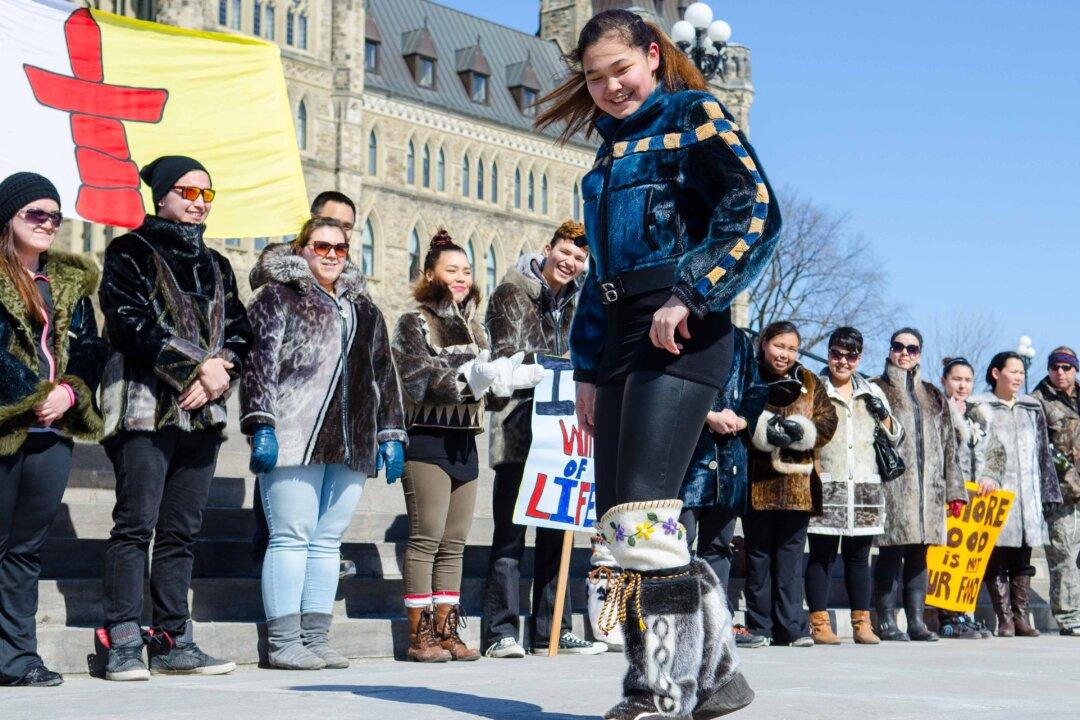PARLIAMENT HILL, Ottawa—Propaganda and cultural bias are hurting Inuit hunters and communities that have relied on seal hunting for millennia and now need it to participate in the modern cash economy.
That was the message from several Inuit on Parliament Hill Tuesday to protest Europe’s seal products ban and share a culture that has evolved to include meticulously tailored sealskin coats that can cost up to $10,000.
Inuit from Canada and Greenland held a fashion show on the steps of Parliament and spoke about the difficulty they’ve faced by a ban that is supposed to exempt them but in reality doesn’t. They are hoping Canada and Norway succeed in an appeal to the World Trade Organization to have the ban overturned.
Environment Minister Leona Aglukkaq and others attended the WTO hearings that began Monday and continued through Wednesday.
If the ban is overturned, it will come as a relief to Nunavut student Terrie Kusugak, an Inuit who says seal meat is one of her favourite foods. She has hunted seal and also wears sealskin clothing.
Kusugak said she has seen hunters lose income from the ban and thinks the European Union is affected by a prejudice that ignores important aspects of the hunt. She is also upset about what little information the ban is based on.
“They could have more understanding from our side of the picture, especially with propaganda used when they say we are clubbing baby seals when in fact the sale of whitecoats (baby seals) has been banned for over 20 years,” she said.
The ban has translated into lower prices for meat and sealskin, making it harder for Inuit to support their families, she said.
“They’re going to still go hunting. They always will, we always have. But it does affect them economically—that’s one way a lot of our hunters make a living.”
For a people who have seen their way of life almost disappear with the arrival of Europeans, it is a difficult thing to be ostracized when attempting to adapt to a world where cash is king and exports across an ocean can support a family at home.
The EU’s ban on trade in seal products, which went into effect in 2009, includes meat and skins. While the EU acknowledges the species of seal hunted in Canada, Norway, and Namibia in Southern Africa, (where 60 percent of seal products originate) are not endangered, it takes exception with the methods of the hunt.
“The European Union is concerned about the animal welfare aspects of the seal hunt. Doubts have been expressed about some of the methods used for hunting seals, such as shooting, netting and clubbing, that can cause avoidable pain and distress,” reads a statement from the European Commission’s Environment Directorate-General.
Double Standard
The Inuit say that’s a double standard and ignores the more obvious ethical problems posed by meat sourced from domesticated animals like beef and pork.
“It is okay for us to eat hamburgers and cows and pigs when they are raised in slaughterhouses and they have very small quarters, and it’s done with no regard for the animal’s life. I think there is a huge prejudice there, and it is really unfair,” Kusugak said, adding that the Inuit hunt seals in a humane and respectful way.
The EU acknowledges that the Inuit have fundamental economic and social interests in the seal hunt and has given them limited exemptions from the ban.
But those exemptions mean little because through the ban the EU has destroyed the market for seal products in a move that smacks of hypocrisy and cultural bias, said the protesters.
Inuit Tapiriit Kanatami, a national advocacy organization of Canada’s Inuit people, says the ban stigmatizes seal products as well as the people who harvest and create those products.
“It’s like you are outside, you are not equal with others,” said Icelandic Inuit Jens Olsen.
He said the ban hurts hunters economically and his people psychologically, and is a slight against the culture they’ve carried on for thousands of years.
“When we catch the seal, we eat the meat, use the fat, use the clothes for clothing and we use the bones in our arts and so on. We use all the seal, nothing is wasted,” he said.
Seal hunting is ethical in ways the EU ban ignores, argues Kusugak.
“There is a direct link between the people that hunt it, the people that eat it, and the people that wear it. One seal will feed many families and it is within our tradition to share our meat and share our food with other families,” she said.
“The seal skin shirt that I am wearing—I know who made it. I know that it wasn’t made in a sweat shop. I know that [those who made it] were given money for it and their kids were fed.”





